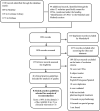Quality of clinical practice guidelines for inadequate response to first-line treatment for depression according to AGREE II checklist and comparison of recommendations: a systematic review
- PMID: 35365512
- PMCID: PMC8977814
- DOI: 10.1136/bmjopen-2021-051918
Quality of clinical practice guidelines for inadequate response to first-line treatment for depression according to AGREE II checklist and comparison of recommendations: a systematic review
Abstract
Objective: To assess similarities and differences in the recommended sequence of strategies among the most relevant clinical practice guidelines (CPGs) for the treatment of depression in adults with inadequate response to first-line treatment.
Data sources: We performed a systematic review of the literature spanning January 2011 to August 2020 in Medline, Embase, Cochrane Library and 12 databases recognised as CPGs repositories. CPGs quality was assessed using the Appraisal of Guidelines for Research and Evaluation II (AGREE II).
Study selection: The eligibility criteria were CPGs that described pharmacological recommendations for treating depression for individuals aged 18 years or older in outpatient care setting. We included CPGs considered of high-quality (≥80% in domain 3 of AGREE II) or recognised as clinically relevant.
Data extraction: Two independent researchers extracted recommendations for patients who did not respond to first-line pharmacological treatment from the selected CPGs.
Results: We included 46 CPGs and selected 8, of which 5 were considered high quality (≥80% in domain 3 of AGREE II) and 3 were recognised as clinically relevant. Three CPGs did not define inadequate response to treatment and 3 did not establish a clear sequence of strategies. The duration of treatment needed to determine that a patient had not responded was not explicit in 3 CPGs and was discordant in 5 CPGs. Most CPGs agree in reassessing the diagnosis, assessing the presence of comorbidities, adherence to treatment, and increase dosage as first steps. All CPGs recommend psychotherapy, switching antidepressants, and considering augmentation/combining antidepressants.
Conclusion: Relevant CPGs present shortcomings in recommendations for non-responders to first-line antidepressant treatment including absence and divergencies in definition of inadequate response and sequence of recommended strategies. Overall, most relevant CPGs recommend reassessing the diagnosis, evaluate comorbidities, adherence to treatment, increase dosage of antidepressants, and psychotherapy as first steps.
Prospero registration number: CRD42016043364.
Keywords: clinical pharmacology; depression & mood disorders; psychiatry.
© Author(s) (or their employer(s)) 2022. Re-use permitted under CC BY-NC. No commercial re-use. See rights and permissions. Published by BMJ.
Conflict of interest statement
Competing interests: None declared.
Figures
References
-
- Thompson C. Affective disorders. In: Thompson C, ed. The instruments of psychiatric research. London, UK: John Wiley & Sons, 1989: 87–126.
-
- World Health Organization . Depression and other common mental disorders: global health estimates. Geneva: WHO, 2017. http://apps.who.int/iris/bitstream/10665/254610/1/WHO-MSD-MER-2017.2-eng...
-
- Bloom DE, Cafiero ET, Jané-Llopis E. The global economic burden of noncommunicable diseases. Geneva: World Economic Forum, 2011.
-
- GBD 2013 DALYs and HALE Collaborators, Murray CJL, Barber RM, et al. Global, regional, and national disability-adjusted life years (DALYs) for 306 diseases and injuries and healthy life expectancy (HALE) for 188 countries, 1990-2013: quantifying the epidemiological transition. Lancet 2015;386:2145–91. 10.1016/S0140-6736(15)61340-X - DOI - PMC - PubMed
Publication types
MeSH terms
Substances
LinkOut - more resources
Full Text Sources
Medical

